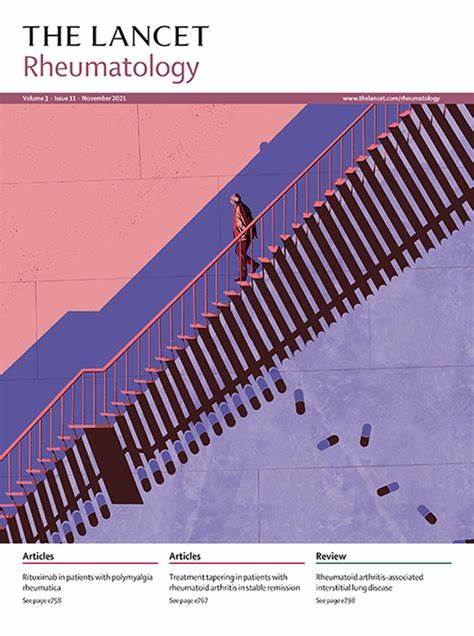扩散型缓释丙酸氟替卡松关节内注射液(EP-104IAR)治疗膝关节骨性关节炎的疗效和安全性(SPRINGBOARD):一项为期 24 周的多中心、随机、双盲、载体对照 2 期试验。
IF 15
1区 医学
Q1 RHEUMATOLOGY
引用次数: 0
摘要
背景:皮质类固醇是治疗膝骨关节炎的少数几种有效药物之一,但作用时间短限制了其效用。EP-104IAR是一种用于关节内注射的丙酸氟替卡松长效制剂,它通过基于扩散的新型缓释技术优化了丙酸氟替卡松的作用。SPRINGBOARD试验评估了EP-104IAR对膝骨关节炎患者的疗效、安全性和药代动力学:SPRINGBOARD是一项随机、药物对照、双盲、2期试验,在丹麦、波兰和捷克共和国的12个研究机构进行。我们招募了年龄在 40 岁或以上、患有原发性膝关节骨关节炎(凯尔格伦-劳伦斯 2-3 级)的成年人,他们的西安大略和麦克马斯特大学骨关节炎关节炎指数(WOMAC)疼痛评分至少为 4 分,在满分 10 分中不超过 9 分。参与者被随机分配(1:1)接受一次25毫克EP-104IAR关节内剂量或药物对照。随机分配是通过交互式网络访问计算机生成的中央预定义列表进行的,每组 6 人(按临床地点分配)。参试者和评估人员对治疗分配进行了蒙蔽。对参与者进行了为期 24 周的随访。主要研究结果是各组间从基线到第12周WOMAC疼痛评分变化的差异,分析对象是所有随机分配并接受治疗的参与者。对所有接受了一定剂量随机分配治疗的参与者的安全性(包括实验室分析)和外周血丙酸氟替卡松的药代动力学进行了评估。一位有膝关节骨关节炎生活经验的人士参与了研究解释和报告撰写。该试验已在ClinicalTrials.gov(NCT04120402)和欧盟临床试验注册中心(EudraCT 2021-000859-39)注册,并已完成:2021年9月10日至2022年11月16日,1294人通过资格筛选,319人被随机分配到EP-104IAR(n=164)或药物对照组(n=155)。EP-104IAR组中有一名参与者因不良事件未接受治疗而被排除在所有分析之外。318名参与者(男性135人[42%],女性183人[58%],白人315人[99%])接受了随机分配的治疗,并被纳入主要分析和安全性分析(EP-104IAR,n=163;药物对照组,n=155)。第12周时,EP-104IAR组WOMAC疼痛评分与基线相比的最小平方平均变化为-2-89(95% CI -3-22至-2-56),药物对照组为-2-23(-2-56至-1-89),组间差异为-0-66(-1-11至-0-21;P=0-0044);显著的组间差异持续到第14周。EP-104IAR组的163名参与者中有106人(65%)出现了一种或多种治疗突发不良事件,而药物对照组的155名参与者中有89人(57%)出现了这种不良事件。EP-104IAR对血清葡萄糖和皮质醇浓度的影响很小,而且是短暂的。没有出现治疗引起的死亡或与治疗相关的严重不良事件。丙酸氟替卡松的血浆浓度显示出钝化的初始峰值,最终半衰期约为18-20周:这些2期研究结果表明,EP-104IAR有可能为膝关节骨关节炎患者提供长达14周的有临床意义的疼痛缓解,比目前市场上销售的皮质类固醇的公开数据更长。EP-104AR对血糖和皮质醇的影响极小,血浆中丙酸氟替卡松的浓度稳定。EP-104IAR的安全性和有效性将在3期试验中进一步评估,包括EP-104IAR双侧用药和重复用药的可能性:资金来源:Eupraxia Pharmaceuticals:摘要的丹麦语译文见 "补充材料 "部分。本文章由计算机程序翻译,如有差异,请以英文原文为准。
Efficacy and safety of a diffusion-based extended-release fluticasone propionate intra-articular injection (EP-104IAR) in knee osteoarthritis (SPRINGBOARD): a 24-week, multicentre, randomised, double-blind, vehicle-controlled, phase 2 trial
Background
Corticosteroids are among the few effective treatments for knee osteoarthritis, but short duration of action limits their utility. EP-104IAR, a long-acting formulation of fluticasone propionate for intra-articular injection, optimises the action of fluticasone propionate through novel diffusion-based extended-release technology. The SPRINGBOARD trial assessed the efficacy, safety, and pharmacokinetics of EP-104IAR in people with knee osteoarthritis.
Methods
SPRINGBOARD was a randomised, vehicle-controlled, double-blind, phase 2 trial done at 12 research sites in Denmark, Poland, and Czech Republic. We recruited adults aged 40 years or older with primary knee osteoarthritis (Kellgren–Lawrence grade 2–3) who reported Western Ontario and McMaster Universities Osteoarthritis Arthritis Index (WOMAC) pain scores of at least 4 and no more than 9 out of 10. Participants were randomly assigned (1:1) to receive one intra-articular dose of 25 mg EP-104IAR or vehicle control. Randomisation was done via interactive web-based access to a central predefined computer-generated list with block size of six (allocated by clinical site). Participants and assessors were masked to treatment allocation. Participants were followed up for 24 weeks. The primary outcome was the difference between groups in change in WOMAC pain score from baseline to week 12, analysed in all participants who were randomly assigned and received treatment. Safety, including laboratory analyses, and pharmacokinetics from quantification of fluticasone propionate in peripheral blood were assessed in all participants who received a dose of randomly assigned treatment. A person with lived experience of knee osteoarthritis was involved in study interpretation and writing of the report. This trial is registered with ClinicalTrials.gov, NCT04120402, and the EU Clinical Trials Register, EudraCT 2021-000859-39, and is complete.
Findings
Between Sept 10, 2021, and Nov 16, 2022, 1294 people were screened for eligibility, and 319 were randomly assigned to EP-104IAR (n=164) or vehicle control (n=155). One participant in the EP-104IAR group was excluded from all analyses because treatment was not administered due to an adverse event. 318 participants (135 [42%] male and 183 [58%] female, 315 [99%] White) received randomly assigned treatment and were included in the primary analysis and safety analysis (EP-104IAR, n=163; vehicle control, n=155). At week 12, least squares mean change in WOMAC pain score from baseline was –2·89 (95% CI –3·22 to –2·56) in the EP-104IAR group and –2·23 (–2·56 to –1·89) in the vehicle control group, with a between-group difference of –0·66 (–1·11 to –0·21; p=0·0044); a significant between-group difference persisted to week 14. 106 (65%) of 163 participants in the EP-104IAR group had one or more treatment-emergent adverse event compared with 89 (57%) of 155 participants in the vehicle control group. Effects on serum glucose and cortisol concentrations were minimal and transient. There were no treatment-emergent deaths or treatment-related serious adverse events. Plasma concentrations of fluticasone propionate showed a blunted initial peak with terminal half-life of approximately 18–20 weeks.
Interpretation
These phase 2 results suggest that EP-104IAR has the potential to offer clinically meaningful pain relief in knee osteoarthritis for an extended period of up to 14 weeks, longer than published data for currently marketed corticosteroids. There were minimal effects on glucose and cortisol, and stable fluticasone propionate concentrations in plasma. The safety and efficacy of EP-104IAR will be further evaluated in phase 3 trials, including the possibility of bilateral and repeat dosing with EP-104IAR.
Funding
Eupraxia Pharmaceuticals.
Translation
For the Danish translation of the abstract see Supplementary Materials section.
求助全文
通过发布文献求助,成功后即可免费获取论文全文。
去求助
来源期刊

Lancet Rheumatology
RHEUMATOLOGY-
CiteScore
34.70
自引率
3.10%
发文量
279
期刊介绍:
The Lancet Rheumatology, an independent journal, is dedicated to publishing content relevant to rheumatology specialists worldwide. It focuses on studies that advance clinical practice, challenge existing norms, and advocate for changes in health policy. The journal covers clinical research, particularly clinical trials, expert reviews, and thought-provoking commentary on the diagnosis, classification, management, and prevention of rheumatic diseases, including arthritis, musculoskeletal disorders, connective tissue diseases, and immune system disorders. Additionally, it publishes high-quality translational studies supported by robust clinical data, prioritizing those that identify potential new therapeutic targets, advance precision medicine efforts, or directly contribute to future clinical trials.
With its strong clinical orientation, The Lancet Rheumatology serves as an independent voice for the rheumatology community, advocating strongly for the enhancement of patients' lives affected by rheumatic diseases worldwide.
 求助内容:
求助内容: 应助结果提醒方式:
应助结果提醒方式:


